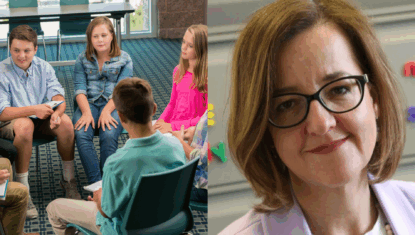Paula Cloutier is a Research Associate in Psychiatric and Mental Health Research at the Children’s Hospital of Eastern Ontario (CHEO). She received her Masters of Arts in experimental psychology from Carleton University in 1991. Her current research activities focus on pediatric mental health service research, and youth self-harm.
Related News
Research Projects
-
HEADS-ED Under 6: A clinician-administered mental health and developmental screening and triage tool
03/04/2025
It is estimated that 10% to 25% of children under the age of 6 years have mental health (MH) concerns (1–5). In young children, MH risk factors may include eating and sleeping problems, late or abnormal development, attachment issues, adverse childhood experiences, behavioural or emotional dysregulation, language delays, and unstable or unsafe home environments (5–7). However, the challenge of measuring prevalence of MH concerns during infancy and early childhood is partially due to low identification rates by health professionals (4,8,9). When clinicians assess infant MH, they can provide resources to parents and/or refer families to specialists if red flags are identified (7). Health professionals who rely solely on clinical judgement detect less than 30% to 50% of MH problems (8); thus, one way to increase early identification and assist with clinical decision-making may be for primary care providers and pediatricians to use MH screening tools (7,10,11).
-
Improving transitions in care for children and youth with mental health concerns: implementation and evaluation of an emergency department mental health clinical pathway
31/03/2025
The emergency department (ED) is a common access point for children and youth seeking mental health (MH) and addiction care [1]. Pediatric MH visits to EDs have significantly increased since 2009 in Ontario, Canada [2,3,4]. Over 50% of children and youth use the ED as the first contact for MH concerns without previously seeking outpatient care, with many patients returning to the ED to seek additional care [5]. Although families increasingly rely on EDs for MH care, these settings are often unprepared to manage children and youth with urgent and emergent MH concerns [5]. EDs lack standardized screening tools, clinical resources, and clinicians trained to confidently manage pediatric MH patients [5,6,7]. Adding to this problem is the complex and fragmented MH system in Canada, which creates difficulty in providing a coordinated transition for patients between the ED and community services. The lack of streamlined referral processes to MH resources in the community results in ED clinicians discharging their patients without appropriate recommendations for follow-up care based on their needs [8]. Each of Ontario’s 33 geographical service areas have lead agencies that are responsible for ensuring that core child and youth MH services are available to their respective communities. Lead agencies can directly deliver these core services or work in partnership with other core service providers in their communities to develop and strengthen pathways to care. Pathways between lead MH agencies and EDs have been established in Ontario and are evolving, but many gaps in care remain.
-
Physician Follow-Up of Pediatric and Young Adult Emergency Department Visits for Substance Use in Ontario, Canada
01/11/2024
-
The HEADS-ED under 6: Piloting a new communimetric mental health and developmental screening and triage tool for young children
10/08/2024
Caregivers are critical to recognizing early mental health (MH) and developmental concerns in their infants and young children and communicating these concerns to their primary care physician. Early risk factors for infant MH concerns can include sleep problems, eating difficulties, abnormal development, attachment issues, emotional or behavioral outbursts, and language concerns (Skovgaard et al., 2006). Pediatricians and primary care providers also play an important role in the early identification of these risk factors and in making referrals to services that can meet their needs (Parkhurst & Friedland, 2020). The Canadian Pediatric Society's MH Task Force (Canadian Pediatric Society, 2023) set out to identify available MH screening tools. Among the tools for infants, one clinician interview and seven parent-report MH screening tools were available and take under 20 min to complete. Upon review of these and other MH screening tools for children under the age of 6 that identify important concerns (Ammitzbøll et al., 2016; Szaniecki & Barnes, 2016), none are created with the intent of communicating needs and action that should be taken for service recommendation and provision.
-
Closing the Referral Loop: Piloting a Clinical Pathway Between Primary Care and Community-Based Mental Health and Addictions Services
21/01/2024



